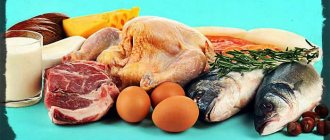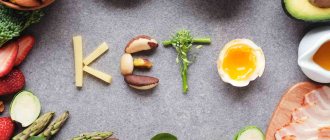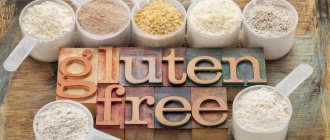Iodine is a halogen and is one of the microelements necessary for the human body. It is part of the thyroid hormones, thus its main function is regulatory.
Hormones containing the element take part in the regulation of metabolism, the rate of chemical reactions, the exchange of proteins, vitamins, etc. Both deficiency and excess of this element cause serious illnesses . You can find out more about the benefits and harms of iodine here.
In total, the body contains from 20 to 50 mg of this element, and it is necessary to know what a person’s daily need for iodine is. We will look at where and what iodine is contained in in this article.
Grocery list
Iodine (below is a list of which foods contain it) enters the human body only with food and water, so those who are deficient in this element need to know in which food its concentration is highest.
Vegetable origin
Most of this element is found in representatives of the plant kingdom, especially in seaweed . Plants absorb iodine from minerals dissolved in water and accumulate it.
- Sea kale (kelp). 100g of this product is enough to completely cover the daily microelement requirement. Pickled seaweed is a heavy, non-dietary product, so it is advisable to make a casserole out of it or eat it in small quantities;
- Persimmon is richer in iodine compounds than other land plants (only algae can compete with it in the content of this element). In addition, persimmons also contain other microelements: magnesium, sodium, iron, as well as vitamins;
- Buckwheat;
- Apple seeds . Some seeds contain so much of the element that you can taste it. To maintain normal concentrations of this halogen in the body, a person only needs to eat 5 seeds a day. However, if overused, symptoms of iodine excess may develop. On the other hand, apple seeds contain the same substances as plum pits, and when decomposed, they release hydrocyanic acid. Therefore, eating a large number of seeds is also fraught with serious poisoning. You should eat the seeds of ripe apples;
- Feijoa is a valuable plant in terms of microelements. Eating both the pulp and the peel is beneficial;
- Spinach and sorrel are quite rich in this element . These plants also contain a lot of vitamins C and K and are often used to make salads in Western countries, where the habit of leading a healthy lifestyle has long been formed. Some sources indicate that spinach holds the record for the amount of iodine among land plants (others attribute 1st place to persimmon);
- Bananas . Sweet fruits contain an average of 3 mcg of this microelement. At the same time, they are well absorbed and practically harmless to any stomach;
- Corn . Eat 100 grams of canned corn for dinner and your daily requirement is met;
- Green bean . This source is not suitable for every stomach. But if you can eat this product, then half a cup a day is enough. Contains also many vitamins.
Animal origin
Animals obtain this microelement mainly from plants, and then accumulate it in certain organs and tissues. Most iodine is found in the liver, adipose tissue, eggs or caviar. Among various species of animals, the organisms of marine inhabitants and birds that feed on grains are richer in this element.
Which foods contain the most iodine:
- Red caviar . This product contains iodine in the most easily digestible form, since absorption is facilitated by vitamins and microelements contained in the same product. In addition, red caviar is quickly digested and is suitable for people with stomach problems;
- Cod liver . This delicious product is very nutritious and contains, in addition to iodine, many other useful substances that help speed up absorption. The amount of iodine in the liver is 350 mcg per 100 grams;
- Shrimps . It is enough to eat 4 servings to completely cover the daily requirement. Shrimp meat is easily digestible, and therefore iodine is quickly absorbed into the blood. In addition, meat is nutritious and contains a lot of protein;
- Tuna meat , especially canned;
- Boiled eggs . You can use eggs of any birds: chicken, goose, quail, pigeon;
Other: What foods contain a lot of iodine: an excellent source of halogen is iodized salt and seasonings based on it, as well as seasonings containing brown algae.
Water may contain iodine in large quantities (especially some types of iodine-bromine mineral waters), or it may not have it at all. This depends on the specific source.
Signs of excess substance in the body
An increased concentration of an important microelement is a consequence of excessive consumption of foods rich in iodine. Some people think that they need to eat not only seaweed, strawberries, yogurt, and shrimp in large quantities, but also flavor many dishes with iodized salt. Such a combination can lead to excessive concentrations of an important trace element. The problem also arises when the absorption and excretion of iodine is impaired.
The toxic effect appears against the background of intake of 2 to 5 mg of iodine; accumulation of 35 to 350 mg of the microelement can lead to death. Conclusion: you need to consult a nutritionist or endocrinologist before starting the prevention of iodine deficiency.
Symptoms of excess iodine accumulation:
- tachycardia,
- iodism is a non-infectious inflammation of the salivary glands, mucous membranes of the nose and throat,
- damage to the epidermis due to the accumulation of high concentrations of iodine,
- numbness of the skin,
- acne,
- loss of strength, lethargy,
- temperature increase,
- headache,
- arterial hypertension,
- development of depression,
- hand trembling.
View a selection of effective treatments for chronic autoimmune thyroiditis of the thyroid gland.
Find out about the normal TSH level in women by age, as well as the symptoms of low levels of the hormone in this article.On the page https://fr-dc.ru/vnutrennaja-sekretsija/polovye/teratoma.html read about what ovarian teratoma is and how to get rid of the formation.
Iodine content in food: table
For clarity, use the table:
| Product | Iodine content in products, mcg/100g |
| Sea fish, shellfish and other animals after processing | 5 — 400 |
| Raw river fish | 243 |
| River fish after heat treatment. | 74 |
| Herring raw | 66 |
| Raw mackerel | 100 |
| Raw oysters | 60 |
| Trout | 3,5 |
| Milk and its derivatives | 4 — 11 |
| Chicken egg | 10 |
| White bread | 6-9 |
| Potato | 4 |
| Greens (parsley, dill) | 6-15 |
| Vegetables | 1-10 |
| Laminaria (and other brown algae) | 500-3000 |
| Trout | 3,5 |
| Flounder | OK. 190 |
| Saira | 200 |
| Salmonidae | 200 |
| Cod liver | 370 |
| Cod | 130 |
| Oatmeal | 20 |
| Champignon mushrooms) | 18 |
| Processed cheese | before 18 |
| Pork | 16,7 |
| Butter | 9 |
| Beans | 12,5 |
| Spinach | 12 |
| Beef | 11,5 |
| Peas | 10 |
| Wheat flour | to 10 |
| Regular bread | 9 |
| Rye | 8,3 |
| Beet | 6,8 |
As can be seen from the table, foods containing iodine in large quantities (which is very beneficial for the thyroid gland) are mainly fish .
Daily norm
The daily need for iodine directly depends on a person’s age, physical condition and individual characteristics of the body. Considering that the microelement is not synthesized by the intestinal microflora, it must be regularly supplied with food or nutritional supplements.
The average daily norm for persons of different age categories is:
- for infants under 2 years old – 50 micrograms;
- for children from 2 to 6 years old – 90 micrograms;
- for children from 7 to 12 years old – 120 micrograms;
- for adults – 150 micrograms;
- for women during pregnancy and breastfeeding – 200 – 300 micrograms;
- for people working with compounds that depress the thyroid gland - 200 - 300 micrograms.
The exact daily dosage of iodine is calculated based on the calculation of 2 - 4 micrograms of the substance per kilogram of body weight.
The upper permissible level of mineral intake is 600 micrograms per day. Exceeding this indicator causes poisoning and intoxication of the body.
If the endocrine system malfunctions, before consuming the mineral, you should consult your doctor regarding the dosage.
Why is iodine important?
This trace element is one of the most important trace elements in the human body, since the human body cannot produce it itself. At the same time, without iodine, the secretion of thyroid hormones and a number of other processes are impossible.
The lack of this element leads to:
- Pathological enlargement of the thyroid gland (endemic goiter);
- Disturbances in the functioning of the nervous system occur: a person becomes tired, drowsy, becomes depressed, memory and attention deteriorate;
- The skin becomes dry and begins to peel, hair breaks, nails peel off;
- A lack of thyroid hormones leads to metabolic disorders: a person rapidly gains weight and experiences a constant feeling of hunger;
- Fluid is retained in the body, causing swelling.
More information about the consequences of shortages can be found here.
Excess iodine is no less dangerous:
- The person becomes nervous and irritable, trembling of the limbs appears, the pulse quickens, a metallic taste appears;
- The fluid quickly leaves the body (a tendency to diarrhea and dehydration appears);
- Hair turns gray faster than usual, pigmentation spots appear on the skin, and immunity weakens.
You can read how else excess can affect a person here.
IMPORTANT . Both excess and deficiency of iodine compounds in food and water pose a potential threat to human health.
Deficiency and symptoms of iodine deficiency in the human body:
Deficiency of this element in the body is quite common. This is possible if the daily diet contains less than 10 mcg of this element. According to the World Health Organization, today more than 1 billion people in the world suffer from a lack of this element. Moreover, this is a problem not only of poor countries, but also of industrialized countries.
Causes of iodine deficiency in the body:
- unsatisfactory amount of microelement intake from food
- low human consumption of seafood
- lack of iodine prophylaxis in iodine-deficient regions
- the presence in the diet of factors that interfere with the absorption and utilization of iodine (intake of excess amounts of bromine, iron, manganese, lead, calcium, chlorine, cobalt)
- taking medications that interfere with the absorption and utilization of iodine (lithium carbonate)
- iodine metabolism disorders
- increase in background radiation
- habitat pollution
- increasing the body's sensitivity to allergens
The population of regions far from the sea experiences the greatest iodine deficiency. In Russia, for example, even plants suffer from its deficiency, since its content in the soil, as a rule, does not exceed 10 μg/kg (and for their normal growth, about 1 mg per kilogram of soil is required).
The lack of this element in the human body can cause many negative phenomena and even diseases.
- Emotional insufficiency with a deficiency of this element is characterized by drowsiness, irritability, apathy, lethargy, forgetfulness, blues, and causeless bad mood. It also manifests itself in decreased attention and memory loss, decreased libido, headaches and increased intracranial pressure. Changes in weather conditions and stress aggravate the condition.
- With an anemic lack of this element in the blood, the level of hemoglobin decreases, which becomes the cause of many serious diseases.
- Cardiological manifestations of iodine deficiency are expressed in arrhythmia, increased lower pressure, atherosclerosis, while traditional treatment does not produce positive results.
- Signs of a lack of this element in the body are also swelling around the eyes, on the face and hands, weakness, muscle pain, thoracic and lumbar radiculitis.
- Long-term lack of iodine in children leads to retardation in physical and mental development, in the development of the skeletal system and brain; lack of iodine during pregnancy causes cretinism and negatively affects the functioning of the child’s internal organs and the growth of his skeleton. In the early stages, an insufficient amount of this element increases the risk of pregnancy regression and miscarriage. During lactation, this can lead to a decrease in milk production.
Symptoms:
Most often, iodine deficiency is signaled by:
- poor appetite;
- fatigue, weakness, bad mood;
- hearing loss, frequent headaches, memory problems;
- excessive hair loss, severe dry skin, tooth decay;
- frequent colds and infectious diseases due to weak immunity;
- shortness of breath and heart pain, heat intolerance.
Benefits for the thyroid gland
Iodine is contained in the hormones secreted by the thyroid gland - thyroxine and triiodotrionine. Each hormone molecule contains 4 microelement atoms, and the triiodotrionine molecule contains 3 atoms.
If there is a lack of this element, the cells of the thyroid gland have nothing to replace it with, and it stops producing hormones.
To compensate for the lack of iodine, the gland begins to increase in size, putting pressure on surrounding organs. Because of this, a large tumor forms in the neck (goiter), and the voice becomes hoarse (the larynx and vocal cords are compressed).
When radioactive isotopes of iodine are present, they can replace non-radioactive iodine and cause thyroid cancer.
Thus, foods high in iodine are extremely beneficial for the thyroid gland.
The effect of iodine on the body
This component plays a huge role in creating full-fledged life, but the human environment cannot synthesize it on its own, so it must be supplied through the air, with food, and water.
If the body has a sufficient amount of this element, it is healthy, active, and develops harmoniously physically and mentally. This substance is responsible for:
- normal functioning of the nervous system;
- for the normal mental development of people;
- controls the composition of vitamins;
- regulates blood cholesterol levels;
- regulates metabolism;
- during pregnancy monitors the development of the fetus;
- forms the formation of bone tissue;
- controls the functioning of the cardiovascular system - heart rate, blood pressure;
- protects the body from penetration of pathogenic viruses and bacteria;
- monitors normal cell development.
Microelement deficiency threatens serious hormonal imbalances.
Symptoms and causes of iodine deficiency
Symptoms
It is important to know the symptoms of iodine deficiency in order to take steps to eliminate it in time. The following signs may indicate iodine deficiency:
- Loss of strength, indifference to current events;
- Lack of appetite;
- Baldness or dull, brittle hair;
- Excess body weight;
- Problems with bowel movements;
- Heart pain, difficulty breathing during exercise and walking;
- Irregularity of the menstrual cycle or its absence;
- Inability to concentrate, absent-mindedness and forgetfulness;
- Visually enlarged thyroid gland (goiter).
If you notice that your neck is enlarged, there is pain when swallowing and you constantly feel a lump in your throat, then this is a reason to consult a specialist.
Causes
The intake of iodine into our body comes from external sources, so the causes of iodine deficiency are:
- Eating insufficient amounts of food rich in iodine;
- Wrong food combination;
- The use of medications that interfere with the absorption of this element;
- Increased radiation levels;
- The polluted air we breathe.
The following people are susceptible to iodine deficiency: elderly people, lactating and pregnant women, as well as children.
Excess iodine
Iodism (excess) has negative consequences for the thyroid gland and human health, so you need to know the symptoms of this disease.
Symptoms of iodism
These include:
- Heart failure and pulmonary edema;
- Wet cough;
- The appearance of a runny nose;
- Increased salivation;
- A sharp deterioration in vision;
- Eating disorders;
- Rashes on the skin of the face, neck and body.
- Frequent headache.
All these symptoms should alert you and be a reason to visit a doctor.
Causes
The reasons may be an overdose of iodine-containing medications or contact with this element, as well as abuse of foods rich in iodine.
Iodine poisoning can occur from improper treatment and drawing iodine nets on the body, as well as from ingesting iodine solution. Iodism can be chronic or acute. The latter occurs due to the intake of a microelement in a large dose and can have serious consequences for human health.
Is it worth taking medications that compensate for the lack of microelements in the body?
Relax on the sea
Worth it, but only after permission and with the appointment of an endocrinologist - uncontrolled use of actively advertised supplements can cause hyperthyroidism and disrupt the functioning of the thyroid gland.
Therefore, without special indications, it is enough to limit yourself to a balanced diet.
Let's dispel a couple more myths:
- You can determine iodine deficiency at home using a mesh made from a pharmaceutical solution - if there is not enough of it, the mesh will fade. This is not true - only laboratory tests can determine the norm. To cope with microelement deficiency, you need to drink pharmaceutical iodine. This statement is not only untrue, but also very likely to end in tragedy: one drop of the drug for treating wounds contains 30 times more than a person’s daily requirement.











